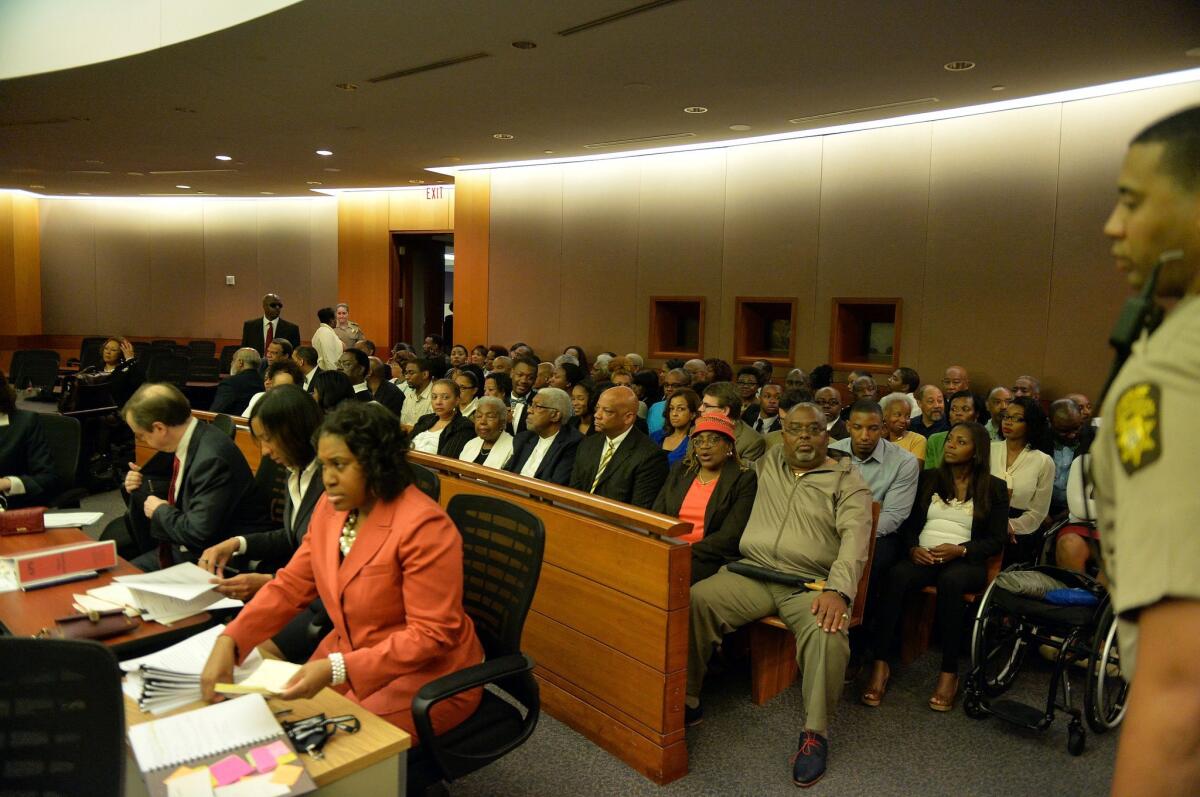Judge urges convicted Atlanta educators to accept deals in cheating case

A court hearing in Atlanta on Monday in the case of educators convicted of cheating on tests.
- Share via
Reporting from Atlanta — The landmark Atlanta public school cheating trial took several unexpected twists Monday when prosecutors offered convicted educators last-minute deals that would exclude harsh prison terms in exchange for taking responsibility and apologizing for changing students’ test scores.
Fulton County Superior Court Judge Jerry W. Baxter announced after four hours of emotional testimony that he had initially planned to reject the deals drawn up by Dist. Atty. Paul Howard and sentence the educators to prison. But he said he received a “divine message” after listening to educators’ friends and former colleagues.
“I thought I had a fair sentence,” Baxter said. “Somehow, this morning it just came to me: The only reason I would send you to jail is for retribution. I think the best thing for our community and this whole sordid mess is for Paul Howard to talk to you, we enter pleas and we all go on our business and pray for these kids that got cheated.”
But attorneys for the educators said they had not agreed to prosecutors’ suggested compromise. The deals would involve punishments ranging from one year of weekends in jail and a $10,000 fine for administrators to one year of home confinement and a $1,000 fine for former teachers and testing coordinators. All would waive their right to appeal.
“I don’t think you want to go the other way,” the clearly dismayed judge warned the educators, who face up to 20 years for racketeering. Although Baxter acknowledged that he was not considering maximum sentences, he said all the defendants faced jail time.
“It’s going to be more than a wrist slap,” he said. “I’m getting the opportunity to mitigate the hot water you’re in.”
Baxter, who has discretion to put the educators on probation or suspend their sentences, urged defense attorneys to discuss the options with prosecutors. After an hourlong meeting, defense attorney Gerald Griggs said prosecutors had been unwilling to negotiate on jail time or first-time offender status.
“Effectively, this would be a life sentence,” said Griggs, an attorney for Angela Williamson, 49, an elementary school teacher who faces up to 35 years in prison if her sentences run consecutively. “Our clients are willing to accept responsibility and say they are sorry, but they want no jail time and they want first-offender rights.” He noted that, unlike those who accepted plea deals before trial, the convicted educators would remain felons.
Two weeks ago, jurors convicted 11 of 12 defendants of violating Georgia’s Racketeer Influenced and Corrupt Organizations Act by conspiring to change students’ answers on tests. Some were also convicted of lesser felonies, such as influencing a witness, theft by taking, false swearing or making a false statement. One educator, who gave birth to a son on Saturday, is to be sentenced in August. One defendant was acquitted.
The Atlanta trial, the largest in a string of recent school district cheating scandals across the nation, was the first to result in criminal racketeering convictions for elementary school teachers. It sprang from a state investigation that implicated at least 178 teachers and administrators in “organized and systemic misconduct” in 44 Atlanta elementary and middle schools. By 2011, more than 80 had confessed, some in exchange for leniency.
In 2013, about three dozen educators were indicted. The alleged ringleader — former Supt. Beverly L. Hall — died March 2, and 21 others pleaded guilty to lesser charges before the trial began.
Prosecutors contended during the trial that administrators set up a high-stakes testing system in which teachers received bonuses or were threatened with demotion, depending on students’ performance in standardized tests.
The result of the educators’ cheating, prosecutors argued, was that thousands of low-income African American students who struggled to read and write were denied federal funds for remedial education.
Backers of the teachers and administrators — all African Americans who worked in low-income neighborhoods — contend they were unfairly targeted with a racketeering statute popularly associated with mobsters and gangsters.
Veteran civil rights leader Andrew Young was among those who packed the courthouse Monday to appeal for mercy.
Some of the educators — who had not testified during the trial — addressed the judge for the first time.
“On April 1, you told us we were convicted felons,” Dana Evans, a former principal, said softly. “I just want to ask if, for the next five minutes, you could consider me as something other than a convicted felon.”
“I think your case is the biggest tragedy of all of them,” Baxter told her, revealing that Evans had counseled his own son at a previous school. “Anyway, I’m sorry. I just want to tell you I consider you a wonderful educator, and that’s what makes it so sad. You were under so much pressure.... My heart goes out to you.”
Evans told Baxter she could not provide him with what he wanted to hear — an admission of guilt — because it was not the truth. But she apologized for the distrust the public now has in public education.
“I’m sorry I had teachers that elected to do things I didn’t ask them to do, and I wasn’t able to uncover it,” she said. “As a leader, I have to take responsibility.”
Young, the former Atlanta mayor and U.S. ambassador to the United Nations, conversed with Baxter on the problems of public education and punishment in the South. He quoted the Rev. Martin Luther King Jr. and compared the cheating trial to landmark school desegregation cases of the 20th century.
“I’ve been in a lot of courtrooms that really made the difference in the history of the South, and in just about every one of those cases it was the heroism and the courage and wisdom of the judge that saved the South,” Young said.
But when Young characterized the teachers as heroes and said, if it were up to him, he would out throw the case, Baxter lost patience.
“Something awful has gone on here,” he said. “There’s more to this than let’s just say forget about it and move on. These were the most vulnerable children in our city, and they were shortchanged.”
nation@latimes.com
More to Read
Sign up for Essential California
The most important California stories and recommendations in your inbox every morning.
You may occasionally receive promotional content from the Los Angeles Times.














